How to Use Herbs to Improve Gut Health in a Natural Way
In recent years, gut health has become a hot topic in the world of wellness. More and more people are recognizing the importance of maintaining a healthy digestive system, not just for digestion, but for overall health. A balanced gut microbiome is linked to improved immunity, better mood, and even clearer skin. But how can you naturally support your gut health? The answer lies in the power of herbs. In this article, we’ll explore how you can use herbs to enhance gut health, backed by science and practical tips.
Understanding Gut Health: Why It Matters
Your gut is home to trillions of bacteria, viruses, and fungi, collectively known as the gut microbiota. These microorganisms play a crucial role in digesting food, producing vitamins, and protecting against pathogens. A balanced gut microbiota is essential for optimal health, while an imbalance can lead to digestive issues, weight gain, and even chronic diseases.
According to a study published in the “Journal of Gastroenterology” in 2022, more than 70% of the immune system is located in the gut. This highlights the importance of maintaining a healthy gut for overall immunity and well-being.
The Role of Herbs in Gut Health
Herbs have been used for centuries in traditional medicine to support digestive health. They contain bioactive compounds that can help balance gut bacteria, reduce inflammation, and promote digestion. Here are some powerful herbs that can naturally improve gut health:
1. Ginger
Ginger is well-known for its digestive properties. It contains gingerols and shogaols, compounds that can enhance gastric motility and relieve nausea. A study from 2023 found that ginger supplementation reduced bloating and discomfort in individuals with irritable bowel syndrome (IBS).
To use ginger for gut health, try adding fresh ginger to your tea, smoothies, or meals. You can also take ginger supplements, but consult with a healthcare professional before starting any new supplement regimen.
2. Peppermint
Peppermint has antispasmodic properties, making it effective in relieving symptoms of IBS, such as abdominal pain and bloating. The menthol in peppermint oil helps to relax the muscles of the gastrointestinal tract.
Consider drinking peppermint tea or using peppermint oil capsules to ease digestive discomfort. As with any herb, it’s important to use peppermint under the guidance of a healthcare provider, especially if you have gastroesophageal reflux disease (GERD).
3. Turmeric
Turmeric contains curcumin, a powerful anti-inflammatory compound. Research has shown that curcumin can help reduce gut inflammation and improve symptoms in conditions like ulcerative colitis and Crohn’s disease.
Incorporate turmeric into your diet by adding it to curries, soups, or smoothies. For enhanced absorption, consume turmeric with black pepper, which contains piperine, a compound that increases curcumin’s bioavailability.
4. Chamomile
Chamomile is not just a soothing bedtime tea; it also has digestive benefits. Its anti-inflammatory and antispasmodic properties can help with indigestion and upset stomachs.
Enjoy chamomile tea after meals to aid digestion and calm your gut. Make sure the tea is brewed properly to extract the maximum benefits.
5. Fennel
Fennel seeds are known for their carminative effects, meaning they help reduce gas and bloating. Fennel can relax the gastrointestinal muscles, making it easier for gas to pass through.
Chewing fennel seeds after meals or drinking fennel tea can be a simple and effective way to improve digestion and reduce bloating.
Creating an Herbal Gut Health Routine
To effectively use herbs for gut health, consider creating a daily routine that incorporates these powerful plants. Here are some tips to get started:
- Start your day with ginger tea: This can kickstart your digestion and set a positive tone for the day.
- Incorporate herbs into meals: Use turmeric and fennel in your cooking to regularly benefit from their gut-friendly properties.
- End your day with chamomile tea: This can help relax your digestive system and prepare you for a restful sleep.
Potential Side Effects and Considerations
While herbs are generally safe, they can interact with medications or cause side effects in some individuals. It’s important to consult with a healthcare provider before starting any herbal regimen, especially if you’re pregnant, nursing, or have underlying health conditions.
For example, while peppermint oil is effective for IBS, it may worsen symptoms in people with acid reflux. Similarly, turmeric may interact with blood thinners and should be used cautiously in such cases.
Conclusion: Embrace Nature’s Gifts for a Healthier Gut
Herbs offer a natural and effective way to support gut health. By incorporating herbs like ginger, peppermint, turmeric, chamomile, and fennel into your daily routine, you can enhance your digestion, reduce inflammation, and improve your overall well-being. Remember to approach herbal remedies with care and seek professional advice when needed.
With a little effort and consistency, you can harness the power of herbs to promote a healthier, happier gut. Start small, listen to your body, and enjoy the journey to better digestive health.
Discover more from NatureZen Market
Subscribe to get the latest posts sent to your email.











